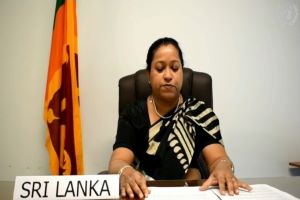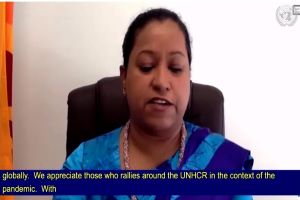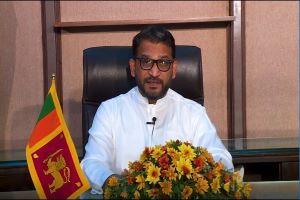Mr. President,
Madam Secretary General and
Distinguished delegates,
I am pleased to join this important international forum to reiterate the importance Sri Lanka attaches to the Conference on Disarmament as the world’s sole multilateral disarmament negotiation forum. Our delegation assures you, Mr. President, of its full support and cooperation to find common grounds for fulfilling the Conference on Disarmament’s obligations towards strengthening international peace and security.
We take this opportunity to reaffirm Sri Lanka’s strong commitment and support for the complete elimination of nuclear weapons. Sri Lanka continues to remain concerned about the lack of progress on nuclear disarmament and the threat such weapons pose to survival of humanity.
Today, we are faced with one of the most challenging moments in human history. Like all obstacles, resolving the current crises requires renewed willingness to think and act collectively, especially to ensure the safety and security of the world we live in. The need for genuine efforts towards achieving this goal is now more important than ever.

Mr President,
At the outset the delegation of Sri Lanka wishes to congratulate you on your assumption of the first Presidency of the 2021 session of the Conference on Disarmament. Our delegation assures you and other P6 Presidents of its full support and cooperation to find common grounds for fulfilling CD’s obligations towards strengthening international peace and security. We are encouraged by the approach of the six presidencies working together as a team in this regard. We also thank the Secretary General of the CD and the CD Secretariat for their support.
Sri Lanka aligns itself with the statement of G21 delivered by Indonesia.
Mr. President, our delegation notes with appreciation the package proposal presented by you on behalf of the six Presidents. We affirm our full support for your efforts to develop this package through a consultative process and reach consensus on a balanced and comprehensive programme of work with a view to resuming multilateral disarmament negotiations, which we have failed to achieve for far too long.

The Eighteenth Meeting of the States Parties to the Convention on the Prohibition of the Use, Stockpiling, Production and Transfer of Anti-personnel Mines and on Their Destruction
Agenda Item: 7. General exchange of views (continued)
Mr. President,
At the outset I would like to commend the excellent manner in which you lead the work of the Convention and to appreciate your team for facilitating this meeting despite the extraordinary circumstances.
Sri Lanka will be pleased to join the Article 5 Implementation Committee exemplifying Sri Lanka’s strong commitment to advancing as well as contributing to the universal realisation of the salutary objectives of the Convention.

International Dialogue on Migration – 2020
Panel 2: Protection of vulnerable migrants during and beyond the COVID-19 crisis.
Statement by Sri Lanka
15 October 2020
Mr Antonio Vittorino, DG/IOM
Excellencies and Colleagues
The focus of this panel on the protection of vulnerable migrants during and beyond the COVID-19 pandemic is not only timely but a present necessity. It is our hope that this discussion will lead to a better understanding of the issues, challenges and gaps in providing protection and assistance to this group, and result in stronger cooperation between Governments and other stakeholders in the development of policies, practises and networks ensuring greater assistance and protection for vulnerable migrants during the present pandemic and beyond.
Migrant workers comprise 3.5% of the world’s population and are a crucial part of the global workforce. The contribution of migrant workers to economic growth and development has become critical not only for the countries of origin, but also for upward socioeconomic mobility in the region and internationally.

UN Human Rights Council Social Forum 2020
The role of the state and public policies to address poverty and inequalities
09 October 2020
Statement by Sri Lanka
Mr. Co-Chair,
At the outset, Sri Lanka wishes to congratulate the distinguished Permanent Representatives of Azerbaijan and Mongolia who serve as co-chair rapporteurs of the 2020 Social Forum, an annual engagement of this Council to which my country attaches great importance.
As a country whose post-independence national policies have been premised exclusively on the wellbeing of its people, the role of the state and the public policies of Sri Lanka have for long years been oriented in the trajectory of addressing poverty and inequalities among its population.

Statement by Sri Lanka at the General Debate of the 71st Annual Session of the Executive Committee (ExCom) of the United Nations High Commissioner for Refugees (UNHCR) programme
Mr. Chairperson,
High Commissioner Mr. Filippo Grandi,
Excellencies, Distinguished delegates,
Sri Lanka takes this opportunity to congratulate you and the Bureau for the excellent manner in which you have steered the work of the Executive Committee since assumption of Office in 2019.
We appreciate the presentation by the High Commissioner and his important remarks on the on how the Global Compact on Refugees has enabled the response to both new and protracted refugee crises, as well as to the COVID-19 emergency. We value his efforts and those of his dedicated staff for their continuous efforts to assist and improve the well-being of over 79.5 million displaced persons worldwide with a view to ensuring sustainable solutions for their concerns. Unfortunately, as per the global trends, the numbers keep on rising, while possibilities for durable solutions become complicated by the day.

45th Session of the Human Rights Council
Item 5: Interactive dialogue with the Assistant Secretary General for Human Rights on the report of the Secretary-General on co-operation with the United Nations, its representatives and mechanisms in the field of human rights
30 September 2020
Statement by Sri Lanka
Madam President,
The Government of Sri Lanka (GoSL) wishes to make the following observations with regard to the reference contained in the Annual Report of the Secretary-General on "Cooperation with the United Nations, its representatives and mechanisms in the field of human rights", presented to this Council:
With regard to alleged “intimidating visits”, “surveillance”, complaints of harassment” and “reprisals” referred to in the Report, the GoSL wishes to make an invitation to the parties concerned to make formal complaints to law enforcement authorities or to independent national institutions such as the Human Rights Commission of Sri Lanka or the National Police Commission, so that action can be taken to investigate the alleged incidents.
The Government has already publicly refuted these allegations, and is committed to protecting and promoting freedom of expression and civil society space, and ensure that complaints received on alleged attacks against journalists, human rights defenders and civil society are investigated and prosecuted.
It is also reiterated that, apart from operating routine security networks in the interest of national security, particularly after the devastating Easter Sunday terrorist attacks, the Security Forces and intelligence agencies are not engaged in monitoring any specific group of people in the country.
We believe that, for any country compromising its national security interests amidst looming sophistication of strategies of radical and extreme elements world around, is bound to face regrettable consequences. Hence, the GoSL requests all parties to be mindful of that ground reality in this context.
- 45th Session of the Human Rights Council – Statement by GoSL – Item 7 General Debate
- Statements by Sri Lanka at the Meeting of the Group of Governmental Experts on Emerging Technologies in the areas of Lethal Autonomous Weapon Systems during 21-25 September 2020
- Statement by Sri Lanka at the Interactive Dialogue with the Special Rapporteur on the situation of human rights in the Palestinian territories occupied since1967, during the 44th session of the Human Rights Council

